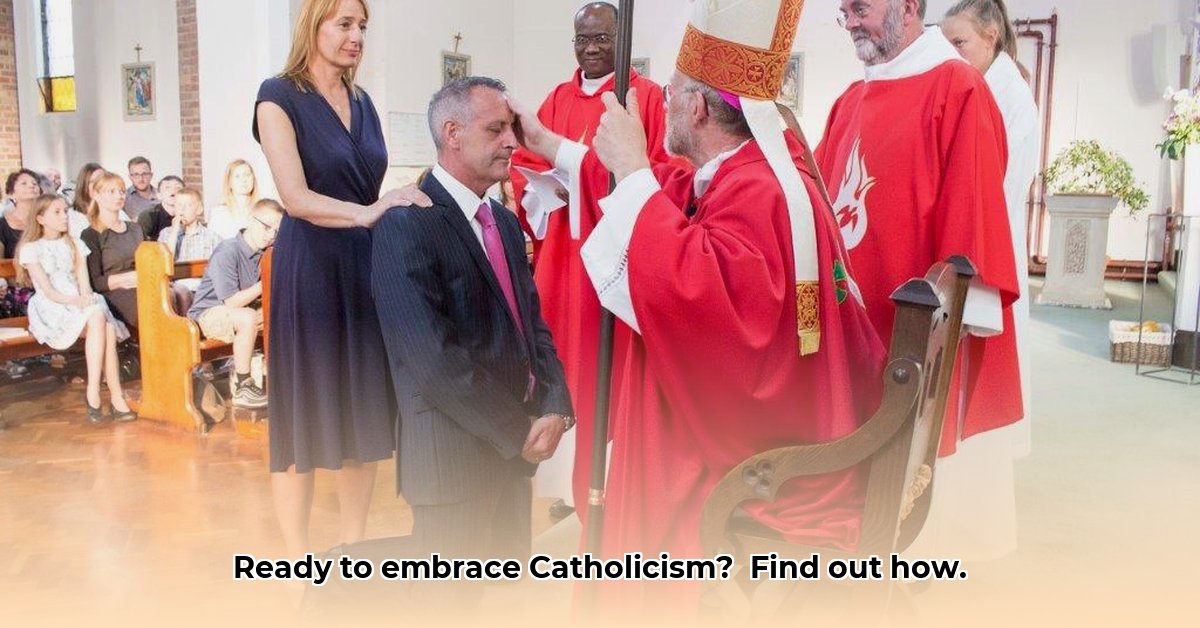Are you considering becoming Catholic? Converting to Catholicism is a profound personal journey, a decision to embrace a rich tradition of faith, community, and spiritual growth. This guide provides a clear roadmap for your conversion process, whether you’re coming from another Christian denomination or are entirely new to faith. For a deeper understanding of Catholic beliefs, see this helpful guide: What it means to be Catholic.
Understanding Your Starting Point: Baptism and Your Path
Your individual journey begins with understanding your baptismal status. Were you baptized in a Christian church using water and the Trinitarian formula (“in the name of the Father, and of the Son, and of the Holy Spirit”)? The Catholic Church recognizes most Trinitarian baptisms as valid. If you’re unsure about the validity of your baptism, or if you haven’t been baptized, it’s crucial to discuss this with a priest. This initial step will clarify your specific conversion path and shape your journey toward full communion with the Catholic Church.
The Rite of Christian Initiation for Adults (RCIA): A Journey of Discovery
For those unbaptized or with baptisms deemed invalid, the Rite of Christian Initiation for Adults (RCIA) is the primary pathway to becoming Catholic. This process, typically spanning a year, provides a structured and supportive environment for learning about and experiencing the Catholic faith. The RCIA isn’t just about acquiring knowledge; it’s a transformative journey of spiritual growth, allowing you to discern God’s call and deepen your relationship with Christ within the context of the Church.
The RCIA is generally structured into four periods:
Period of Inquiry (Pre-Catechumenate): This initial phase allows you to explore Catholicism, ask questions, and discern your readiness for this commitment. It’s a time for reflection and dialogue, where you can voice your doubts and seek clarity about the Church’s teachings and practices.
Period of the Catechumenate: During this stage, you delve into the core tenets of Catholic belief, exploring Scripture, Tradition, and the sacraments. You’ll engage in discussions, learn prayers, and begin to participate more fully in the life of the parish community.
Period of Purification and Enlightenment (Lent): As Easter approaches, this period emphasizes prayer, reflection, and spiritual preparation for receiving the sacraments of initiation. You’ll participate in special rites known as scrutinies, designed for self-examination and deeper conversion.
Period of Mystagogy (Post-Baptismal Catechesis): After receiving the sacraments of Baptism, Confirmation, and Eucharist at the Easter Vigil, this period focuses on integrating you into the Catholic community. You’ll continue to learn, deepen your understanding of the sacraments, and grow in your faith through ongoing formation and fellowship.
Conversion for Baptized Christians: Building Bridges of Faith
If you’ve received a valid Trinitarian baptism, your journey focuses on reconciling your prior Christian experience with Catholic teachings. This process, often shorter than the RCIA, involves instruction to address any doctrinal differences and to deepen your understanding of the Catholic faith. You’ll also celebrate the Sacrament of Reconciliation (Confession) and receive the Sacrament of Confirmation, completing your initiation into the Catholic Church. This process culminates with your first reception of Holy Communion, welcoming you to the Eucharistic table.
Taking the First Steps: Practical Guidance for Your Journey
Ready to begin? Here are practical steps to guide you:
Locate a Parish: Use online directories or diocesan websites to find Catholic parishes near you. Explore their websites and note Mass times and contact information. Consider visiting different parishes to find a community where you feel welcomed and supported.
Connect with a Priest or Deacon: Contact the parish you’ve chosen and express your interest in converting. Schedule a meeting to discuss your spiritual journey and learn about the specific conversion process offered by that parish.
Embrace Open Dialogue: Ask any questions you have, no matter how big or small. The Church encourages thoughtful inquiry, and priests are there to guide and support you in your discernment.
Cultivate a Life of Prayer: Personal prayer and reflection are essential throughout your conversion. Spend time in quiet contemplation, seeking God’s guidance and deepening your understanding of His love.
Navigating Common Questions and Concerns
What about my doubts? Doubts are a natural part of any faith journey. Share them openly with a priest, who can offer guidance and support as you wrestle with these questions.
Are there any fees involved? There are typically no fees associated with becoming Catholic. The Church welcomes all who sincerely seek Christ.
What if I’m not ready? There’s no pressure to convert. Take your time to explore, learn, and discern God’s will for your life. The Church welcomes you to participate in Mass and other activities as you discern your path.
Embracing Your Catholic Faith Journey: A Lifelong Adventure
Converting to Catholicism is not a destination but a lifelong journey of faith. The Church welcomes you with open arms and offers a supportive community to accompany you on this path. Take the first step today, and discover the richness and depth of the Catholic faith.
- Unlock Filipino Culture: A Deep Dive into Traditions and Practices - April 23, 2025
- Unlock Spanish Culture: Insights & Opportunities Now - April 23, 2025
- White Spirit Uses & Substitutes: A Deep Dive for Pros & DIYers - April 23, 2025















